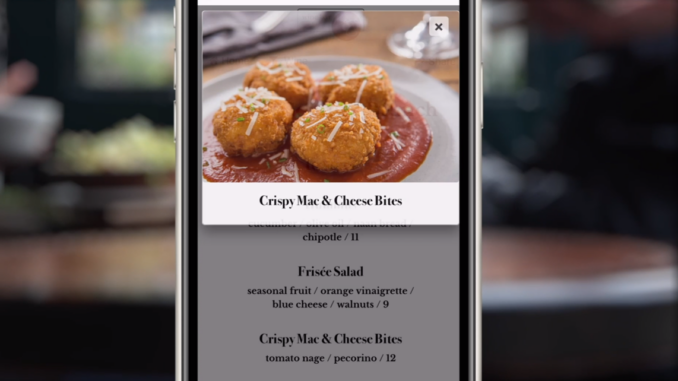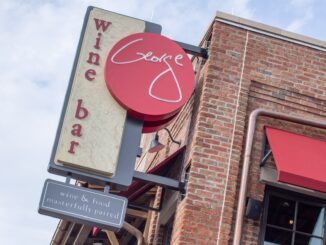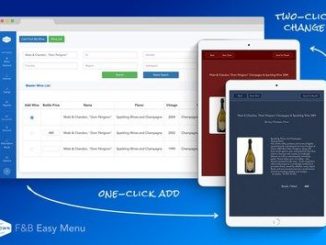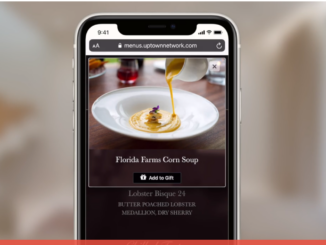
9.16.2020
Hospitality technology solution provider Uptown Network has announced that its BYOM™ (Bring Your Own Menu) restaurant technology has been accessibility-certified. Achieved in cooperation with web accessibility solution accessiBe, BYOM lets restaurants and hospitality providers serve guests with QR-code-driven mobile menus on their personal devices that are open and responsive to everyone. By comparison, the common ways of making menus mobile—particularly PDFs on smartphones—are not accessible.
It’s estimated that in 2019 more than 11,000 lawsuits were filed in federal court for violating the Americans with Disabilities Act (ADA) Title III [1], with estimated average settlement costs of $16,000 for restaurants and other businesses that are considered open to the public. (This does not count lawsuits filed at the state level.) BYOM provides an inclusive mobile menu experience that automatically adjusts to safely and interactively serve guests who have epilepsy, blindness or visual impairment, cognitive disabilities, ADHD, and motor impairments.
“As restaurants are navigating safe reopenings, many are turning to BYOM to replace wasteful, single-use paper menus or cumbersome PDF menus,” said Jack Serfass, co-founder and CEO of Uptown Network. “While restaurants are essentially having to re-engineer their guest experiences for safety, becoming or remaining broadly accessible is an ever-present concern. BYOM can help deliver an engaging, safe experience that gives all guests the confidence to come back while reducing risk for the restaurant.”
Designed for Accessibility, Now Certified
BYOM liberates restaurant menus from being trapped in paper or PDF format, and the associated risks and costs. Guests enjoy an interactive mobile experience that looks like a menu (not a web site or PDF file), including updating in real time to reflect the availability of items or specials. Everyone has access to the same menu, enhancing the communal dining experience—including one-click sharing of menus with friends down the street or around the world.
By working with accessiBe, BYOM is now able to support the widest array of browsers and assistive technologies while providing highly personalized mobile menu experiences.
BYOM is compatible with and optimized for popular screen readers (such as JAWS, NVDA, VoiceOver and TalkBack) installed on blind users’ devices, which are automatically prompted with screen reader optimization as soon as they access BYOM. BYOM is also optimized for keyboard navigation, for people with motor impairment.
Guests with epilepsy who use BYOM can stop all running animations (including CSS-flashing transitions) with the click of a button, reducing risk of seizures. Guests with hearing devices can mute the entire BYOM site, to prevent potentially disturbing automatic audio from playing. Guests can use content highlighting, adjust fonts, select from various color contrast profiles, and even access a specialty search engine linked to Wikipedia and Wiktionary that enables people with cognitive disorders to decipher meanings of phrases, initials and slang.
Raising the Standard in Digital Menus
BYOM is fast becoming the digital-menu industry standard for hospitality brands as they reopen, as a replacement for single-use paper menus often mandated by regulators. More than 750,000 guests have started using BYOM since its launch in May.
Through creative use of QR codes and other innovations, Uptown Network’s BYOM runs on guests’ personal devices without the need to download a separate app or wrestle with cumbersome PDFs. BYOM eliminates the cost, time, and risk involved in using paper menus. It also prevents all those single-use paper menus from ending up in landfills, reduces menu-printing and associated shipping costs, and drives sales through its flexible, multiple-menu format and built-in analytics. BYOM has saved restaurants more than five million pieces of paper and $1 million in printing costs so far, according to company estimates.
The BYOM experience is social and menus have been shared in all 50 states and 70 countries. Guest reviews on OpenTable, Yelp! and TripAdvisor have been favorable.
[1] Source: Seyfarth Shaw LLP, February 20, 2020
Does your company have news it would like to share with our readers? If so, we invite you to review our editorial guidelines and submit your press release for publishing consideration.




